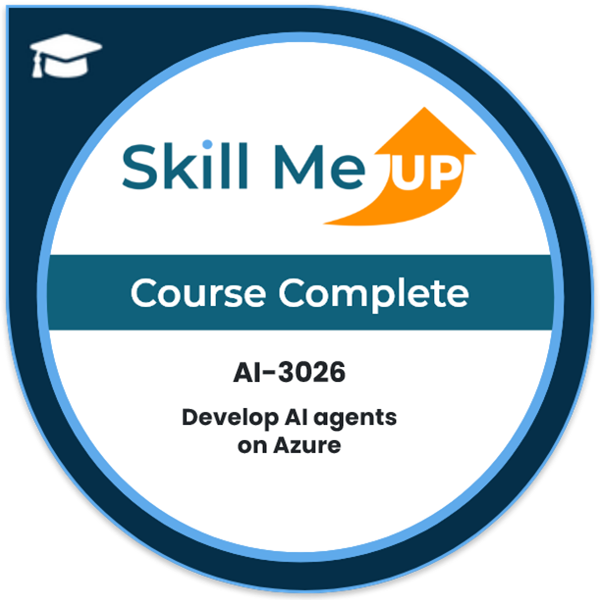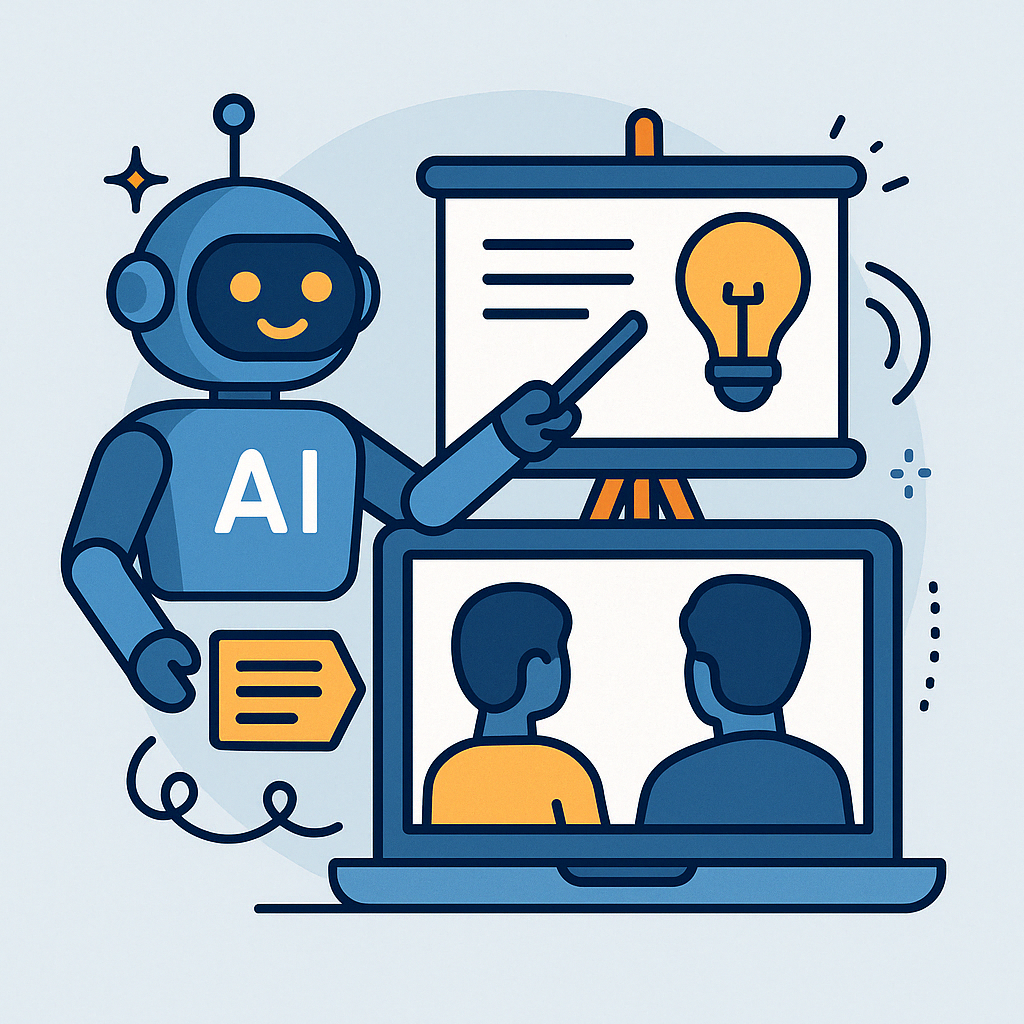AI-3026: Develop AI agents on Azure
AI-3026: Develop Generative AI Apps using Azure AI Studio
Course Overview
AI-3026 is an advanced, hands-on course designed to equip developers, data scientists, and AI practitioners with the skills required to design, build, and deploy generative AI applications using Microsoft Azure’s AI Studio and Foundry Portal. Learners will explore the complete lifecycle of generative AI app development—from prompt engineering to fine-tuning models, incorporating retrieval-augmented generation (RAG), evaluating output quality, and applying responsible AI principles.
Through expert-led instruction and guided labs, students will gain deep, practical experience with Azure AI tools such as Prompt Flow, custom model tuning, and built-in evaluation features to streamline the development and deployment of production-grade generative AI solutions.
Target Audience
This course is intended for:
Professional developers building AI-powered applications
Data scientists and ML engineers integrating generative models into solutions
Solution architects designing intelligent application workflows
AI/ML professionals exploring responsible deployment of generative AI systems
Prerequisites
Before taking this course, learners should have:
Experience with Python programming and REST APIs
Basic understanding of machine learning and deep learning concepts
Familiarity with Azure services such as Azure Machine Learning, Azure Cognitive Services, or Azure OpenAI
Ability to use the Azure portal and Azure CLI
Optional but helpful:
Experience with large language models (LLMs)
Understanding of prompt engineering concepts
Exposure to tools like LangChain, Semantic Kernel, or similar frameworks
Learning Objectives
By the end of this course, students will be able to:
Navigate and utilize Azure AI Studio and Foundry Portal for generative AI projects
Apply prompt engineering techniques to customize model behavior
Build and manage Prompt Flows to orchestrate data, tools, and model interactions
Implement Retrieval-Augmented Generation (RAG) to ground LLM responses using custom data
Fine-tune foundation models using custom datasets for domain-specific tasks
Evaluate generative AI models for quality, performance, and safety
Integrate responsible AI principles into generative AI application development
Lessons
Introduction to Azure AI Studio and the Foundry Portal
Prompt Engineering and Prompt Flow Pipelines
Building Retrieval-Augmented Generation (RAG) Workflows
Customizing and Fine-Tuning Generative Models
Evaluating and Operationalizing Generative AI Applications
- Category: AI and Machine Learning
- Level: Advanced
- Time Estimate: 7h 30m
- Price: $99 for 3 months of access
- Subscription: $39.99 per month after 7-day free trial
- Lab Environment: Included
- Free Trial: 7 Days

Lessons in this Course

Lesson 1: Introduction to AI Agents and Azure AI Foundry
Unlock the full potential of generative AI with Microsoft’s Azure AI Studio. In this introductory lesson, you’ll explore the Azure AI Studio and Foundry Portal—your central workspace for building, managing, and deploying generative AI applications.
You’ll learn how to create AI projects, connect data sources, and provision the tools needed to build intelligent solutions using powerful foundation models. This lesson sets the stage for everything to come by giving you hands-on experience with the platform and guiding you through best practices for managing AI resources in Azure.
By the end of this lesson, you’ll understand how Azure AI Studio fits into the generative AI development workflow—and you’ll be ready to start building your first AI-powered project.
Duration: 1 h 30 mExercises

Lesson 2: Build an AI Agent with Code Interpreter
In this lesson, you’ll take your AI agent skills to the next level by enabling your agent to execute live Python code using Azure AI Studio’s built-in Code Interpreter tool.
You’ll learn how to build an intelligent agent that can analyze data, generate charts, perform calculations, and return downloadable results—transforming your agent into a true computational assistant. Whether it's summarizing business metrics or visualizing trends, this capability is a game-changer for automating data-driven tasks.
Through a hands-on lab, you’ll configure the agent, connect it with a Python client, upload datasets, and interact with it through dynamic prompts. By the end of this lesson, you’ll know how to empower agents to deliver real-time insights and visualizations—all powered by code execution in a secure, sandboxed environment.
Duration: 1 h 30 mExercises

Lesson 3: Extend Agents with Custom Functions
In this lesson, you’ll learn how to take AI agents beyond conversation and into action. Using custom functions, you’ll enable agents to perform real-world tasks like submitting support tickets, retrieving data, or triggering operations—based on natural language prompts from users.
You’ll define Python functions, register them as tools, and integrate them into an agent’s toolkit using Azure AI Foundry. Then, you’ll see how the agent intelligently decides when to call these functions based on user intent.
Through a hands-on lab, you’ll build a support assistant that collects problem details and creates a simulated support ticket. This lesson demonstrates how to give your agents the power to act, not just respond—unlocking powerful automation potential across industries.
Duration: 1 h 30 mExercises

Lesson 4: Use Semantic Kernel to Build Agents
This lesson introduces you to Semantic Kernel (SK)—Microsoft’s open-source SDK for building code-first, intelligent AI agents. Unlike UI-driven tools, Semantic Kernel offers full control and flexibility through plugins, making it ideal for developers who want to create reusable, modular AI workflows.
You’ll learn how to define plugins, manage conversational threads, and build agents that can perform structured tasks like sending emails or integrating with external systems. With support for both Python and C#, SK provides deep customization while still leveraging the power of large language models.
Through a hands-on lab, you’ll build an expense submission agent that uses a plugin to simulate sending a claim email. This lesson shows how SK helps you scale AI agent development with clean architecture and real-world integrations.
Duration: 1 h 30 mExercises

Lesson 5: Orchestrate Multi-Agent Solutions
In this final lesson, you’ll learn how to design and orchestrate multi-agent AI systems using Microsoft’s Semantic Kernel SDK. Instead of relying on a single agent to handle every task, you’ll build a team of specialized agents—each with distinct roles, tools, and responsibilities—that work together to solve complex problems.
You’ll explore real-world coordination strategies such as how agents take turns, share context, and determine when a task is complete. Through hands-on practice, you’ll create an automated incident resolution system featuring a log analysis agent and a DevOps remediation agent, working together in a coordinated conversation.
By the end of this lesson, you’ll be able to build scalable, role-based AI solutions that reflect how real teams operate—collaborating to achieve outcomes more efficiently than a single model can on its own.
Duration: 1 h 30 m